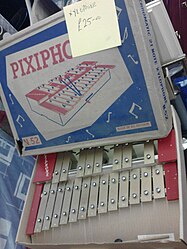
The glockenspiel or bells is a percussion instrument consisting of pitched aluminum or steel bars arranged in a keyboard layout. This makes the glockenspiel a type of metallophone, similar to the vibraphone.

Marianne Evelyn Gabriel Faithfull is an English rock singer-songwriter and actress. She achieved popularity in the 1960s with the release of her hit single "As Tears Go By" and became one of the lead female artists during the British Invasion in the United States.

Angelo Daniel Badalamenti was an American composer and arranger best known for his film music, notably the scores for his acclaimed collaborations with director David Lynch, Blue Velvet (1986), the Twin Peaks television series, The Straight Story (1999), and Mulholland Drive (2001).

David Bowie is the debut studio album by the English musician David Bowie, originally released in the United Kingdom on 1 June 1967 through Decca subsidiary Deram Records. Produced by Mike Vernon and recorded from November 1966 to March 1967 in London, the album followed a string of singles Bowie released for Pye Records that failed to chart. Vernon hired numerous studio musicians for the album's sessions; Bowie and his former Buzz bandmate Derek Fearnley composed music charts themselves using a musical guidebook.

"I Dig Everything" is a single by the English singer-songwriter David Bowie. It was his final single for Pye Records, released on 19 August 1966. The track was originally demoed with Bowie's then-band, the Buzz, but producer Tony Hatch was unhappy with their efforts and replaced them with session players. It is a pop song that musically and lyrically reflected the mid-1960s Swinging London era. The single was another commercial failure and resulted in the label dropping him. The original recording was included on the Early On (1964–1966) compilation in 1991.
"Shadow Man" is a song written by the English singer-songwriter David Bowie. It was recorded on 15 November 1971 at Trident Studios in London during the sessions for The Rise and Fall of Ziggy Stardust and the Spiders from Mars (1972) and left unreleased until 2024 on the Rock 'n' Roll Star! box set. A folk ballad, the lyrics discuss topics of self-identity and doubling, and the impact one's present self has on their future lives, themes some linked to the Shadow concepts of Carl Jung.
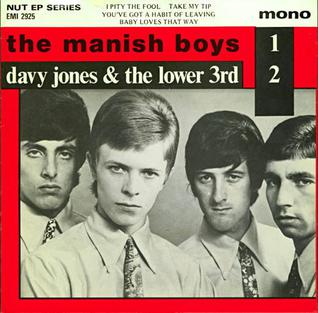
"You've Got a Habit of Leaving" is a song by the English singer-songwriter David Bowie, recorded and released as a single on 20 August 1965 through Parlophone. Released under the name Davy Jones, it featured his band at the time, the Lower Third, whose contributions were uncredited. Produced by Shel Talmy and recorded in early July 1965, the single marked a departure from the Americanised R&B of his two earlier singles into Who-style mod music. The original recording later appeared on the compilation albums Early On (1964–1966) (1991) and Nothing Has Changed (2014).
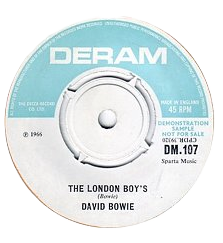
"The London Boys" is a song by the English musician David Bowie. It was first released as the B-side of the single "Rubber Band" in the United Kingdom on 2 December 1966. It was originally written and demoed in 1965 with the Lower Third for potential release as the artist's debut single for Pye Records but it was rejected. After a year of rewrites, he recorded a new version with a new band, the Buzz, which helped secure him a record contract with Decca-subsidiary Deram Records. Unlike the A-side, "The London Boys" retains the Mod feel of Bowie's previous singles. The dark lyrics concern a 17-year-old who leaves home for London and becomes embroiled in the Mod scene, turning to pills to fit in. Like his previous singles, it failed to chart. Decca later issued it as an A-side in 1975.

Broken English is the seventh studio album by English singer Marianne Faithfull. It was released on 2 November 1979 by Island Records. The album marked a major comeback for Faithfull after years of suffering due to drug abuse, homelessness, and anorexia. It is often regarded as her definitive recording and Faithfull herself has described it as her "masterpiece".

My People Were Fair and Had Sky in Their Hair... But Now They're Content to Wear Stars on Their Brows is the debut album by psychedelic folk band Tyrannosaurus Rex. The release of the album was planned for early May but delayed until 5 July 1968 by record label Regal Zonophone.

Before the Poison is the sixteenth studio album by British singer Marianne Faithfull, recorded in 2003 and released in France on 28 September 2004, and in the United States on 25 January 2005.

The World of David Bowie is a compilation album by the English singer-songwriter David Bowie, released on 6 March 1970 by Decca Records as part of their The World of... series following Bowie's success with the "Space Oddity" single. It primarily consists of material he recorded in 1967 for Decca subsidiary Deram, including all but four tracks from his debut album David Bowie, as well as three previously unreleased songs — "Karma Man", "Let Me Sleep Beside You" and "In the Heat of the Morning" — and the 1966 B-side "The London Boys". The tracklisting was approved by Bowie himself, while the sleeve photo was provided by David Bebbington. The album was reissued in April 1973 with a Ziggy Stardust-era sleeve photo.
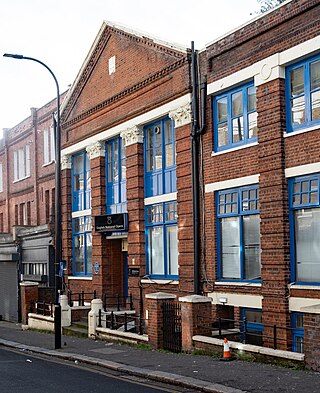
Decca Studios was a recording facility at 165 Broadhurst Gardens, West Hampstead, North London, England, controlled by Decca Records from 1937 to 1980.
Eric Schermerhorn is an American guitarist, composer, and voiceover artist. As a musician, he has worked with David Bowie, Iggy Pop, Ric Ocasek, Richard Butler, The The, They Might Be Giants, Melissa Etheridge, P!nk, Christina Aguilera, Seal, and Sheryl Crow. As a voiceover artist, he has had minor roles in Family Guy and American Dad!.

T. Rex were an English rock band formed in London in 1967 by singer-songwriter and guitarist Marc Bolan, who was their leader, frontman and only consistent member. Though initially associated with the psychedelic folk genre, Bolan began to change the band's style towards electric rock in 1969, and shortened their name to T. Rex the following year. This development culminated in 1970 with their first significant hit single "Ride a White Swan", and the group soon became pioneers of the glam rock movement.

Anna Margaret Michelle Calvi is an English singer-songwriter and guitarist. Her accolades include three Mercury Prize nominations, one Brit Award nomination, and a European Border Breakers Award. She has been noted by some critics as a virtuoso guitarist, as well as for her powerful, wide-ranging operatic contralto voice and sometimes androgynous stage appearance.
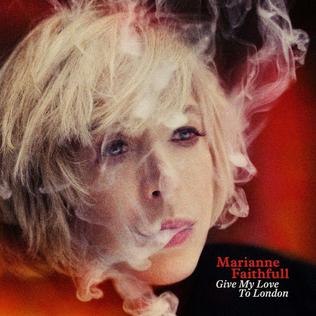
Give My Love to London is the 19th studio album by British singer Marianne Faithfull. The 11-track album was released on 29 September 2014 on the Dramatico and Naïve record labels. In America and Canada, it was issued on 10 November by Easy Sound. It includes collaborations with Nick Cave, Anna Calvi, Roger Waters and Brian Eno. "Sparrows Will Sing" was released as a single from the album.
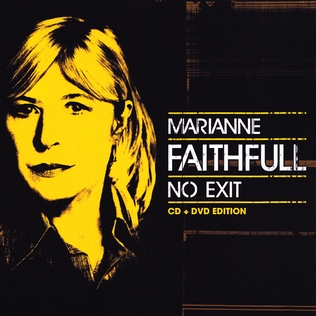
No Exit is a 2016 live album by English pop singer Marianne Faithfull. The album was released as both an audio work and a concert film made up of a 92-minute performance in 2014 and a bonus 30-minute collection of songs from 2016.

The 1980 Floor Show was a rock musical spectacle featuring English rock musician David Bowie as the protagonist, held at the Marquee Club in Soho, London, on October 18–20, 1973. It was broadcast in the United States by NBC on November 16, 1973, as part of the series The Midnight Special, and presented the last performance of Bowie as his character Ziggy Stardust.
"Let Me Sleep Beside You" is a song written and recorded by the English singer-songwriter David Bowie. It was recorded on 1 September 1967 at Advision Studios in London and marked the beginning of Bowie's working relationship with producer Tony Visconti, which would last for the rest of Bowie's career. A departure from the pop and music hall-influenced material of Bowie's 1967 self-titled debut album and other singles for Deram Records, the song displays a more rock-oriented sound with a cello arrangement from Visconti. The impressionist lyrics also depart from Bowie's prior works, describing love using the act of sleeping together rather than through emotional attachment. The song was rejected by Deram for release as a single, purportedly due to the risqué title. It remained unreleased until 1970's The World of David Bowie compilation.
